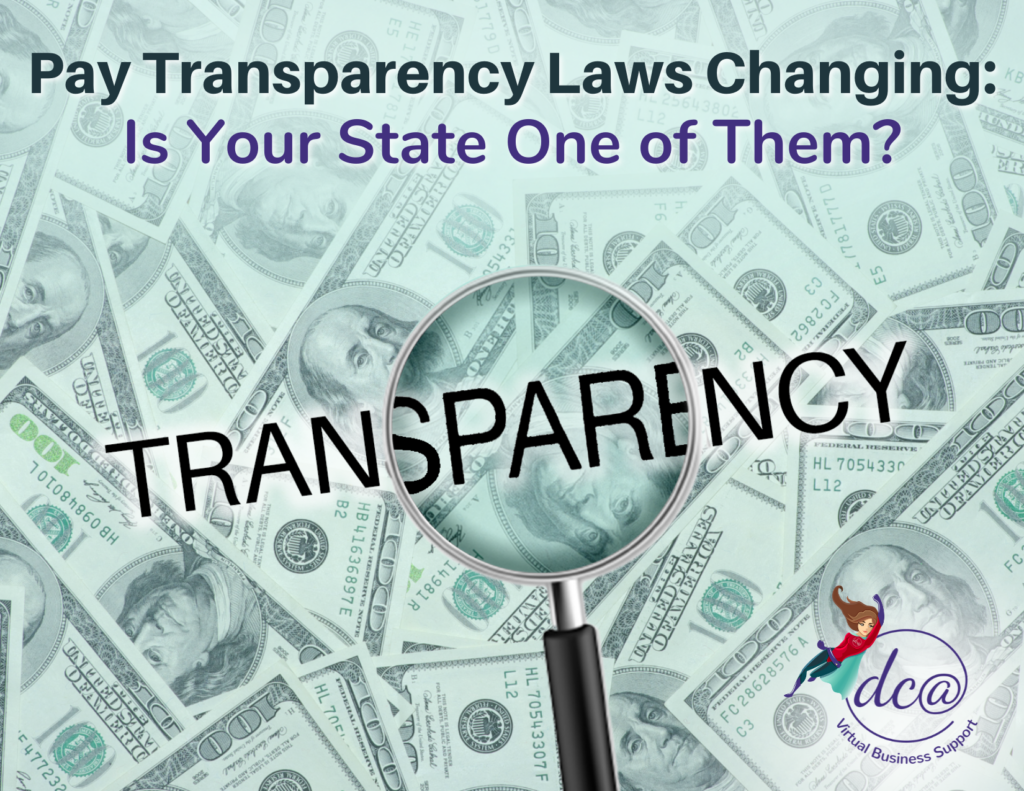
Pay Transparency Laws Changing: Is Your State One of Them?
DCA Virtual Business Support and the author of this article are not attorneys. This information is compiled as a resource to our small business owner community and should not be construed as legal advice.
Some states are making changes to their pay transparency laws. So far, Washington, California, Colorado, Connecticut, Maryland, Nevada, New Jersey, New York, Ohio, and Rhode Island have all issued new pay transparency laws, and we have good reason to believe more states will follow. It’s important for you to comply with these laws if you do business in one of these states or if you hire in any of them. So, let us help you by taking out the guesswork of understanding pay transparency laws!
What are Pay Transparency Laws?
Pay transparency laws vary from state to state, but overall, they oblige employers to provide their employees with information regarding their pay and benefits. Information that falls under this umbrella can include disclosing salary ranges internally and externally on job listings, the type of benefits offered, pay records, and any other information relevant to the employee’s pay and benefits.
For example, as of January 2023, Washington’s pay transparency law requires employers with fifteen or more employees to disclose the wage or salary range internally and externally to job candidates, even on job postings.
How Do Pay Transparency Laws Support Employees?
Pay transparency laws contribute to greater transparency, accountability, and fairness in the workplace. Employers may be required to grant employees access to their pay records, so employees can verify that they are getting paid correctly. They also help eliminate pay discrimination by making sure employees are paid equally for the same work. Pay transparency laws are set in place to ensure that employees are compensated fairly and not taken advantage of. Think of them like a government ordered financial guardian for employees.
How Employers Can Best Manage Pay Transparency
Employers can efficiently manage pay transparency, promote fair compensation practices, create a transparent work environment, and gain trust from employees by applying these practices.
Ensure that Equal Pay Laws are Obeyed: Learn about the equal pay legislation in all the states you have employees or do business in. And make sure your compensation practices are in line with them. Conduct internal audits proactively to find any potential wage discrepancies.
Create Clearly Defined Compensation Processes: Put in place a compensation structure that clearly states the pay ranges for each role held within the organization, so employees are given a clear outline of how their pay is calculated and how it relates to their position. Ensure that all employees are aware of this.
Encourage Open Discussion: Within the organization, encourage open and transparent discussion concerning compensation. Create an environment that promotes pay discussions by allowing employees to discuss their wages. This can assist in proactively identifying and addressing any potential concerns.
Management and HR Professionals: Provide managers and HR professionals with training and instruction on fair pay practices, such as the importance of pay transparency, regulatory requirements, and how to effectively communicate about compensation.
Review Compensation Practices Regularly: Keep your compensation practices current by examining and revising them frequently in accordance with state laws and industry trends. This makes it easier to maintain the fairness, competitiveness, and transparency of your company’s compensation practices.
Takeaways
In summary,
- Pay transparency laws require employers to provide employees with information about their pay and benefits.
- Pay transparency laws vary from state to state, so stay up-to-date on the laws in your state and the state(s) you hire in.
- Pay transparency laws help protect employees from unfair pay practices.
Interested in learning more about pay transparency laws? Give this episode of the Nurture Small Business podcast a listen!
